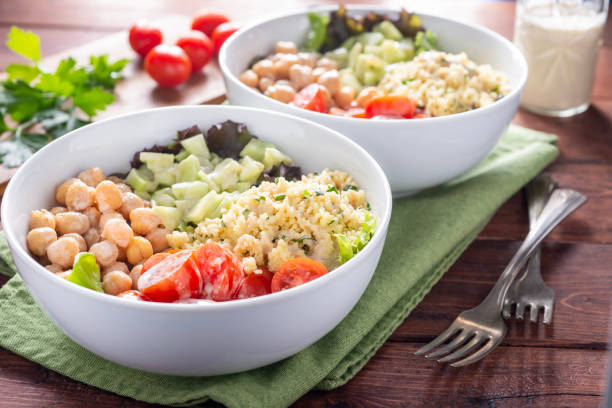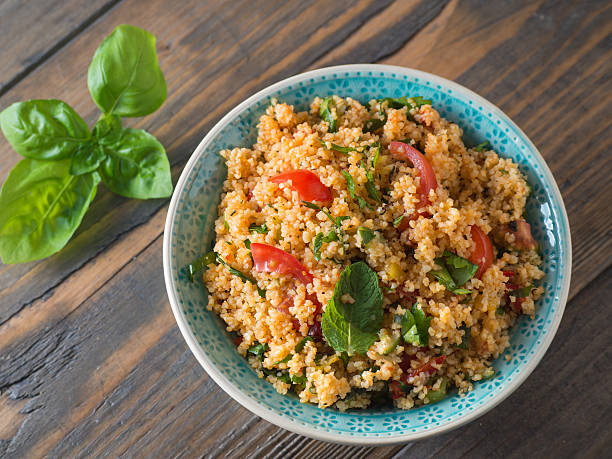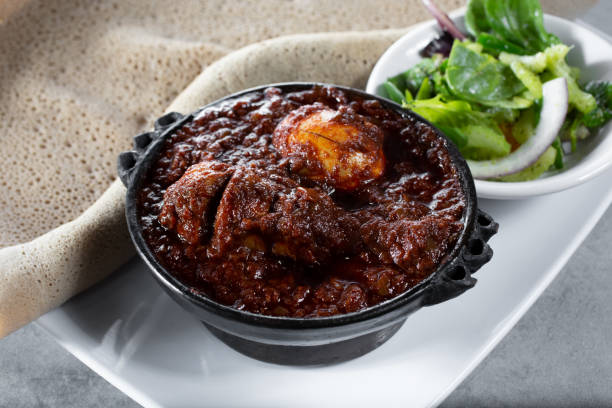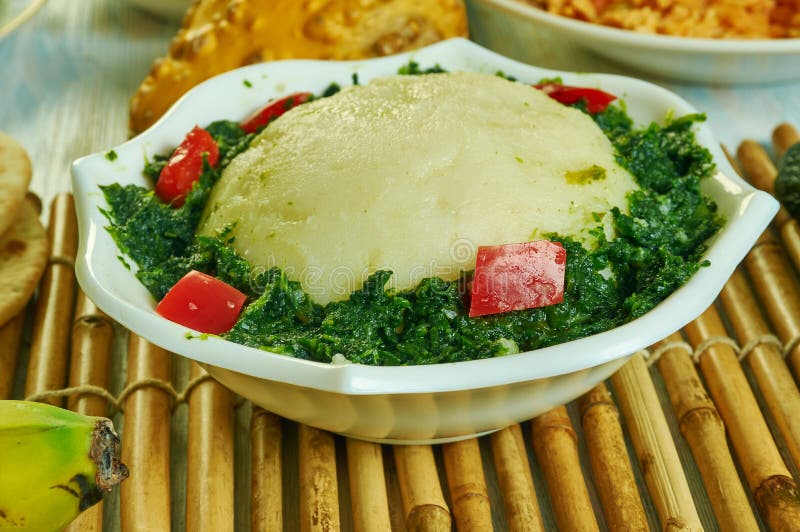Couscous is widely enjoyed for its light texture, versatility, and quick preparation. Made from semolina wheat, couscous resembles tiny pasta grains and is often used as a base for stews, salads, and vegetable dishes. While it is sometimes mistaken for a whole grain, couscous is technically a processed grain product. Despite this, it offers several nutritional benefits, including carbohydrates for energy, essential vitamins and minerals, and dietary fiber. This essay explores the nutritional value of couscous and its role in a balanced

Couscous is primarily composed of carbohydrates, making it an excellent source of energy. A one-cup serving of cooked couscous contains approximately 36 grams of carbohydrates, which are essential for fueling the body and supporting brain function.
Unlike refined carbohydrates such as white bread or pastries, couscous provides complex carbohydrates that release energy gradually, preventing blood sugar spikes and crashes. This makes it a suitable choice for those looking for a steady and sustained energy source, particularly for athletes, active individuals, or anyone needing long-lasting fuel throughout the day.
Though not as protein-rich as quinoa or legumes, couscous still provides a moderate amount of protein. A single cup of cooked couscous contains about 6 grams of protein, contributing to muscle growth, tissue repair, and overall bodily functions.
For individuals following a plant-based diet, couscous can be paired with legumes (such as chickpeas or lentils) or nuts to form a complete protein source, ensuring the intake of all essential amino acids.

Couscous is naturally low in fat, with less than 1 gram of fat per serving. This makes it an excellent choice for individuals looking to maintain a healthy weight or reduce their fat intake. Additionally, couscous is relatively low in calories, with about 175 calories per cooked cup, making it a light and satisfying alternative to heavier grain-based dishes like rice or pasta.
Since couscous absorbs flavors well, it can be prepared with herbs, spices, and lean proteins to create delicious, nutrient-dense meals without excessive calories or unhealthy fats.

Couscous contains several B vitamins, including thiamine (B1), niacin (B3), and folate (B9), which play vital roles in metabolism and overall health:
- Thiamine (B1): Supports energy metabolism and nerve function.
- Niacin (B3): Helps convert food into usable energy and supports digestion.
- Folate (B9): Essential for DNA production, cell growth, and red blood cell formation, making it particularly important for pregnant women.
These B vitamins help maintain a healthy nervous system, support brain function, and prevent deficiencies that could lead to fatigue or neurological

Couscous provides important minerals that support various bodily functions:
- Selenium: One of the standout nutrients in couscous, selenium is a powerful antioxidant that helps protect cells from damage, supports immune function, and promotes thyroid health. A single serving of couscous provides nearly 60% of the daily recommended intake of selenium.
- Magnesium: Helps with muscle function, heart health, and bone strength.
- Phosphorus: Supports bone and dental health while playing a key role in energy metabolism.
- Iron: Aids in oxygen transport in the blood and helps prevent iron-deficiency anemia.
These minerals make couscous a nutrient-dense food that contributes to overall well-being.

Whole wheat couscous, in particular, provides a good amount of dietary fiber, which is beneficial for digestion and gut health. Fiber helps:
- Regulate bowel movements and prevent constipation.
- Support a healthy gut microbiome.
- Promote satiety, helping with weight management by reducing overeating.
- Regulate blood sugar levels, making it beneficial for individuals with diabetes.
Regular consumption of fiber-rich foods like whole wheat couscous can contribute to long-term digestive health and overall wellness.

Traditional couscous has a moderate glycemic index (GI), meaning it can cause a moderate rise in blood sugar levels. However, whole wheat couscous has a lower GI, making it a better option for individuals managing diabetes or blood sugar fluctuations. Whole wheat couscous retains more fiber and nutrients, providing a slower and more stable release of energy compared to refined couscous.

One of the greatest advantages of couscous is its versatility. It absorbs flavors well and pairs well with a variety of ingredients, including:
- Vegetables (bell peppers, zucchini, tomatoes, spinach) for added vitamins and antioxidants.
- Lean proteins (chicken, fish, tofu, chickpeas) to enhance protein content.
- Healthy fats (olive oil, nuts, seeds) for added flavor and essential fatty acids.
By combining couscous with nutrient-dense ingredients, meals can be made more balanced and healthf

Couscous is a nutritious and versatile food that provides essential carbohydrates, protein, vitamins, and minerals while remaining low in fat and calories. Its high selenium content makes it a powerful antioxidant-rich food, while its B vitamins support energy metabolism and overall health. Choosing whole wheat couscous further enhances its fiber and nutrient profile, making it an excellent option for digestive health and blood sugar regulation.
Whether used as a base for stews, salads, or side dishes, couscous is an excellent addition to a balanced diet. Its ease of preparation and ability to pair with various nutrient-rich ingredients make it a convenient and healthful choice for many people worldwide.





Great insights on balancing gameplay – it’s reassuring to see platforms like tyy.AI Tools promoting responsible tech use. Their AI Twitter Assistant is a smart tool for mindful engagement.
https://shorturl.fm/NJmxR
https://shorturl.fm/wTPSK
https://shorturl.fm/lRehS
https://shorturl.fm/aw54C
https://shorturl.fm/olh12
https://shorturl.fm/6Dsvd
https://shorturl.fm/END22
https://shorturl.fm/ivQi5
https://shorturl.fm/QtfoL
https://shorturl.fm/Z7Rev
https://shorturl.fm/3fTTp
https://shorturl.fm/e1Evo
https://shorturl.fm/tORIO
https://shorturl.fm/CHizk
https://shorturl.fm/0YCtZ
https://shorturl.fm/GGPxo
https://shorturl.fm/0BsuB
https://shorturl.fm/vaJwC
https://shorturl.fm/C8D1e
https://shorturl.fm/kZEZt
https://shorturl.fm/8b3cz
https://shorturl.fm/20mMF
https://shorturl.fm/j2XaB
https://shorturl.fm/Fh22B
https://shorturl.fm/izoT3
https://shorturl.fm/8TEhy
https://shorturl.fm/zUCLx
https://shorturl.fm/JJiDN
https://shorturl.fm/4h7rj
https://shorturl.fm/kc2mW
https://shorturl.fm/6C9Bd
https://shorturl.fm/nb5GF
https://shorturl.fm/XrumS
https://shorturl.fm/4VpZE
https://shorturl.fm/LnPjs
https://shorturl.fm/pcGAZ
https://shorturl.fm/5Gpsr
https://shorturl.fm/k2yXi
https://shorturl.fm/ei5KK
https://shorturl.fm/YUAyH
https://shorturl.fm/IFAf4
https://shorturl.fm/N8jmu
https://shorturl.fm/xZHmR
https://shorturl.fm/rBT9I
https://shorturl.fm/HwsxH
https://shorturl.fm/JzQNx
https://shorturl.fm/0eLYu
https://shorturl.fm/YdXxI
https://shorturl.fm/lL0FG
https://shorturl.fm/YMvY3
https://shorturl.fm/vNjYM
https://shorturl.fm/SMVqL
https://shorturl.fm/Uopxl
https://shorturl.fm/9j6tm
https://shorturl.fm/TR8Jt
https://shorturl.fm/NYkND
https://shorturl.fm/BMGht
https://shorturl.fm/5QW91
https://shorturl.fm/Mag1A
https://shorturl.fm/nxqWh
https://shorturl.fm/mU9xf
https://shorturl.fm/MJeRC
https://shorturl.fm/TtRWz
https://shorturl.fm/prTiW
https://shorturl.fm/GYUCb
https://shorturl.fm/SnphQ
https://shorturl.fm/z4Obl
https://shorturl.fm/axOhy
https://shorturl.fm/yHXPP
https://shorturl.fm/EM8An
https://shorturl.fm/I5EmT
https://shorturl.fm/EYvX5
https://shorturl.fm/qkD5Q
https://shorturl.fm/wG6P5
https://shorturl.fm/PanUe
https://shorturl.fm/34sGX
https://shorturl.fm/jdrGE
https://shorturl.fm/cLhDO
https://shorturl.fm/K0t1k
https://shorturl.fm/7tPTp
https://shorturl.fm/bNkc1
https://shorturl.fm/mCSek
https://shorturl.fm/c9FGS
https://shorturl.fm/UzoLR
https://shorturl.fm/Qiic9
https://shorturl.fm/VqmZW
https://shorturl.fm/KRhlM
https://shorturl.fm/nWUO8
https://shorturl.fm/Er3OW
https://shorturl.fm/BXkfX
https://shorturl.fm/nQNVT
https://shorturl.fm/pcmSN
https://shorturl.fm/9dEL3
https://shorturl.fm/9SJgt
https://shorturl.fm/39AEL
https://shorturl.fm/1F1RY
https://shorturl.fm/OTI4r
https://shorturl.fm/dS4CR
https://shorturl.fm/MPncj
https://shorturl.fm/yc8KJ
https://shorturl.fm/fCPPi
https://shorturl.fm/v1nhb
https://shorturl.fm/pi1EB
https://shorturl.fm/gbSMc
https://shorturl.fm/9pALg
https://shorturl.fm/qWUYN
https://shorturl.fm/bU4kR
https://shorturl.fm/aSXi8
https://shorturl.fm/ldTVT
https://shorturl.fm/dxAQJ
https://shorturl.fm/SntRm
https://shorturl.fm/aCvI2
https://shorturl.fm/GUGGE
https://shorturl.fm/vq4rt
https://shorturl.fm/iwdTc
https://shorturl.fm/Q5wMP
https://shorturl.fm/xMtYh
https://shorturl.fm/WSa2B
https://shorturl.fm/2g4zS
https://shorturl.fm/ihXHZ
https://shorturl.fm/k3rac
https://shorturl.fm/TsHoH
https://shorturl.fm/HZ1Qk
https://shorturl.fm/xl3wj